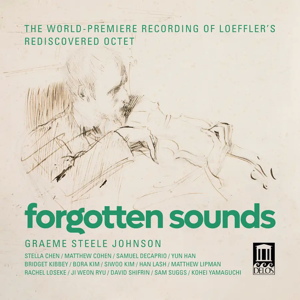
Forgotten Sounds
Claude Debussy (1862-1918)
Prélude à l’après-midi d’un faune (1894, arr. Graeme Steele Johnson for flute, clarinet, harp, two violins, viola, cello and double bass)
Charles Martin Loeffler (1861-1935)
Octet for two clarinets, harp, two violins, viola, cello and double bass (1896)
Timbres oubliés (1899, arr. Graeme Steele Johnson and Bridget Kibbey for clarinet and harp)
rec. 2019-24
Delos DE3603 [45]
In 2018, clarinetist Graeme Steele Johnson arranged Debussy’s Prelude a l’apres-midi d’un faune for flute, clarinet, harp, string quartet and double bass. As we can hear, he did a superlative job. He then sought other works for a similar ensemble, and recalled mentions of an octet by American Charles Martin Loeffler, only with a second clarinet instead of a flute. The piece was heard twice in 1897 and then disappeared. Johnson found that the work had never been printed or recorded. With effort, he located the manuscript in the Library of Congress, much altered by the composer since its premiere, and in a generally disordered state. It took Johnson a year to produce a performing edition, and all that time he had no idea how the music would sound. He need not have worried. The work more than justifies his effort.
Virgil Thomson once described Loeffler’s music as “old fashioned impressionism of the Franco-Boston school”. This only goes so far. Loeffler’s other influences included César Franck, the medieval modes and the folk music of Russia and Hungary, where he spent some of his childhood. He lived in the Boston area all his adult life, so there even is a little bit of New England snap. The Octet shows most of these influences, plus a rarer one in his music, that of Brahms. His chamber music for strings appeared on Naxos: review ~ review.
The Octet’s vigorous opening exemplifies Loeffler’s skill at turning the various influences into something unique. Equally impressive is the scoring, completely idiomatic for each instrument, notably for the clarinets. The rather mysterious development section recalls some of his later works; the last section ably synthesizes what has come before. The appealing slow movement begins thoughtfully, and achieves an almost Mozartian delicacy and lightness. The Andante – Allegro finale marked a la Zingara (in Gypsy style) seems to evoke the composer’s childhood memories, but becomes more serious before the opening music returns with a virtuoso flourish.
As a pendant, Johnson and harpist Bridget Kibbie play an arrangement of one of Loeffler’s best-known songs, Timbres oubliés.
In addition to his musical and musicological duties here, Johnson serves as producer. He has twice gathered groups of mostly young players. Both ensembles give spirited and idiomatic performances. With the excellent recording, one could not ask for more. I was especially impressed by the harpists and the wind players. The program is quite short, but if you are interested in American music at the turn of the twentieth century, the disc is obligatory.
William Kreindler
Buying this recording via a link below generates revenue for MWI, which helps the site remain free.



Performers and recording details
Prélude à l’après-midi d’un faune
Graeme Steele Johnson (clarinet), Ji Weon Ryu (flute), Han Lash (harp), Bora Kim (violin), Rachel Loseke (violin), Matthew Cohen (viola), Yun Han (cello), Kohei Yamaguchi (double bass)
2019, Morse Recital Hall, Yale University, Connecticut, USA
Octet
Graeme Steele Johnson (clarinet), David Shifrin (clarinet), Bridget Kibbey (harp), Stella Chen (violin), Siwoo Kim (violin), Matthew Lipman (viola), Samuel DeCaprio (cello), Sam Suggs (double bass)
2023, Oktaven Audio, Mount Vernon, New York, USA
Timbres oubliés
Graeme Steele Johnson (clarinet), Bridget Kibbey (harp)
2024, Elmwood Road Studio, South Salem, New York, USA

















